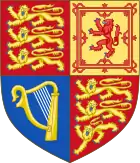Crown dependencies
The Crown dependencies (French: Dépendances de la Couronne; Manx: Croghaneyn-crooin) are three island territories off the coast of Great Britain that are self-governing possessions of The Crown: the Bailiwick of Guernsey, the Bailiwick of Jersey and the Isle of Man. They do not form part of either the United Kingdom or the British Overseas Territories.[1][2] Internationally, the dependencies are considered "territories for which the United Kingdom is responsible", rather than sovereign states.[3] As a result, they are not member states of the Commonwealth of Nations.[4] However, they do have relationships with the Commonwealth and other international organisations, and are members of the British–Irish Council. They have their own teams in the Commonwealth Games.
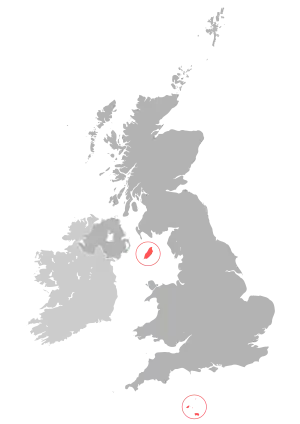
| This article is part of a series on |
| Politics of the United Kingdom |
|---|
.svg.png.webp) |
|
|
As the Crown dependencies are not sovereign states, the power to pass legislation affecting the islands ultimately rests with the government of the United Kingdom (though this is rarely done without the consent of the dependencies, and the right to do so is disputed). However, they each have their own legislative assembly, with the power to legislate on many local matters with the assent of the Crown (Privy Council, or in the case of the Isle of Man in certain circumstances the lieutenant-governor).[5] In Jersey and the Isle of Man, the head of government is called the Chief Minister. In Guernsey the head representative of the committee-based government is the President of the Policy & Resources Committee.
Definition
"The Crown" is defined differently in each Crown Dependency. In Jersey, statements in the 21st century of the constitutional position by the Law Officers of the Crown define it as the "Crown in right of Jersey",[6] with all Crown land in the Bailiwick of Jersey belonging to the Crown in right of Jersey and not to the Crown Estate of the United Kingdom.[7] Legislation of the Isle of Man defines the "Crown in right of the Isle of Man" as being separate from the "Crown in right of the United Kingdom".[8] In Guernsey, legislation refers to the "Crown in right of the Bailiwick",[9] and the Law Officers of the Crown of Guernsey submitted that "The Crown in this context ordinarily means the Crown in right of the république of the Bailiwick of Guernsey"[10] and that this comprises "the collective governmental and civic institutions, established by and under the authority of the Monarch, for the governance of these Islands, including the States of Guernsey and legislatures in the other Islands, the Royal Court and other courts, the Lieutenant Governor, Parish authorities, and the Crown acting in and through the Privy Council."[11] This constitutional concept is also worded as the "Crown in right of the Bailiwick of Guernsey".[10]
| Name | Location | Title of Monarch | Area | Population | Island | Arms | Capital | Airport |
|---|---|---|---|---|---|---|---|---|
| Bailiwick of Guernsey |
English Channel | Duke of Normandy | 78 km2 (30 sq mi) | 65,849 | Alderney |
Saint Anne | Alderney Airport | |
Guernsey |
Saint Peter Port (capital of the whole Bailiwick and of Guernsey also) |
Guernsey Airport | ||||||
Sark |
The Seigneurie (de facto; Sark does not have a capital city) |
(none) | ||||||
| Bailiwick of Jersey |
English Channel | Duke of Normandy | 118.2 km2 (46 sq mi) | 106,800 | Jersey |
Saint Helier | Jersey Airport | |
| Isle of Man | Irish Sea | Lord of Mann | 572 km2 (221 sq mi) | 84,997 | Isle of Man |
Douglas | Isle of Man Airport (Ronaldsway Airport) |
Channel Islands: Bailiwicks of Jersey and Guernsey
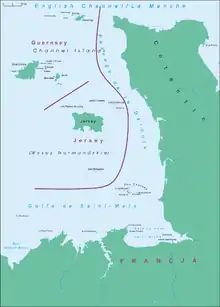
Since 1290,[12] the Channel Islands have been governed as:
- the Bailiwick of Guernsey, comprising the islands of Alderney, Brecqhou, Guernsey, Herm, Jethou, Lihou, and Sark;
- the Bailiwick of Jersey, comprising the island of Jersey and uninhabited islets such as the Écréhous and Minquiers.
Each Bailiwick is a Crown dependency and each is headed by a Bailiff, with a Lieutenant Governor representing the Crown in each Bailiwick. Each Bailiwick has its own legal and healthcare systems, and its own separate immigration policies, with "local status" in one Bailiwick having no jurisdiction in the other. The two Bailiwicks exercise bilateral double taxation treaties. Since 1961, the Bailiwicks have had separate courts of appeal, but generally the Bailiff of each Bailiwick has been appointed to serve on the panel of appellate judges for the other Bailiwick.
Bailiwick of Guernsey
The Bailiwick of Guernsey comprises three separate jurisdictions:
- Alderney, including smaller surrounding uninhabited islands.
- Guernsey, which includes also the nearby islands of Herm and Jethou, and other smaller uninhabited islands.
- Sark, which also includes the nearby island of Brecqhou, and other smaller uninhabited islands.

The parliament of Guernsey is the States of Deliberation, the parliament of Sark is called the Chief Pleas, and the parliament of Alderney is called the States of Alderney. The three parliaments together can also approve joint Bailiwick-wide legislation that applies in those parts of the Bailiwick whose parliaments approve it.
Guernsey issues its own coins and banknotes:
These circulate freely in both Bailiwicks alongside UK coinage and English and Scottish banknotes. They are not legal tender within the UK.[13]
There are no political parties in any of the parliaments; candidates stand for election as independents.[14]
Guernsey has its own separate international vehicle registrations (GBG – Guernsey, GBA – Alderney), internet domain (.gg – Guernsey), and ISO 3166-2 codes, first reserved on behalf of the Universal Postal Union (GGY – Guernsey) and then added officially by the International Organization for Standardization on 29 March 2006. In any case the GBG on a numberplate is only put on the number plate of a car or motorbike at the request of the vehicle owner and is not compulsory, however a motorbike/scooter can have an identical number to a car, e.g. 5432 on 2 wheels and on 4 wheels.
Bailiwick of Jersey
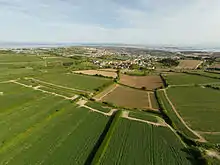
The Bailiwick of Jersey consists of the island of Jersey and a number of surrounding uninhabited islands.
The parliament is the States Assembly, the first known mention of which is in a document of 1497.[15] The States of Jersey Law 2005 introduced the post of Chief Minister of Jersey, abolished the Bailiff's power of dissent to a resolution of the States and the Lieutenant Governor's power of veto over a resolution of the States, and established that any Order in Council or Act of the United Kingdom proposed to apply to Jersey must be referred to the States so that the States can express their views on it.[16]
Jersey issues its own coins and banknotes:
These circulate freely in both Bailiwicks alongside UK coinage and English and Scottish banknotes. They are not legal tender within the UK but are legal currency backed by deposits at the Bank of England.
There are a few political parties, as candidates generally stand for election as independents (but see List of political parties in Jersey).
Jersey has its own separate international vehicle registration (GBJ – Jersey), internet domain (.je – Jersey), and ISO 3166-2 codes, first reserved on behalf of the Universal Postal Union (JEY – Jersey) and then added officially by the International Organization for Standardization on 29 March 2006.
Isle of Man
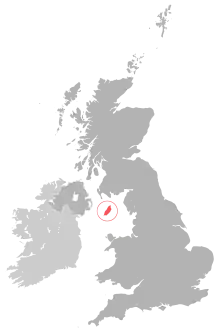
The Isle of Man's Tynwald claims to be the world's oldest parliament in continuous existence, dating back to 979. (However, it does not claim to be the oldest parliament, as Iceland's Althing dates back to 930.) It consists of a popularly elected House of Keys and an indirectly elected Legislative Council, which may sit separately or jointly to consider pieces of legislation, which, when passed into law, are known as "Acts of Tynwald". Candidates mostly stand for election to the Keys as independents, rather than being selected by political parties. There is a Council of Ministers headed by a Chief Minister.[17]
The Isle of Man issues its own coins and banknotes:
These circulate freely on the island alongside British coinage (as well as coinage from the Channel Islands and Gibraltar) and English, Northern Irish and Scottish banknotes.
The Isle of Man, unlike the other Crown dependencies, has a Common Purse Agreement with the United Kingdom.
Isle of Man Post issues its own stamps and derives significant revenue from the sale of special issues to collectors.
The Isle of Man has its own separate international vehicle registration (GBM – Isle of Man), internet domain (.im – Isle of Man), and ISO 3166-2 codes, first reserved on behalf of the Universal Postal Union (IMN – Isle of Man) and then added officially by the International Organization for Standardization on 29 March 2006. In addition, since 2008 the Isle of Man has used the aircraft registration M-.
Relationship with the British Crown
In each Crown dependency, the monarch is represented by a Lieutenant Governor, but this post is largely ceremonial. Since 2010 the Lieutenant Governors of each Crown dependency have been recommended to the Crown by a panel in each respective Crown dependency; this replaced the previous system of the appointments being made by the Crown on the recommendation of UK ministers.[18][19] In 2005, it was decided in the Isle of Man to replace the Lieutenant Governor with a Crown Commissioner, but this decision was reversed before it was implemented.
All "insular" legislation has to receive the approval of the "Queen in Council", in effect, the Privy Council in London.[20] Certain types of domestic legislation in the Isle of Man, however, may be signed into law by the Lieutenant Governor, using delegated powers, without having to pass through the Privy Council. In Jersey, provisional legislation of an administrative nature may be adopted by means of triennial regulations (renewable after three years), without requiring the assent of the Privy Council.[21] Much legislation, in practice, is effected by means of secondary legislation under the authority of prior laws or Orders in Council.
Bailiwicks of Guernsey and Jersey
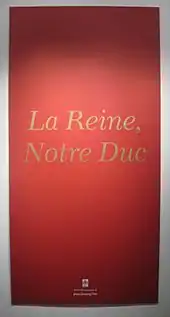
The Channel Islands are part of the territory annexed by the Duchy of Normandy in 933 from the Duchy of Brittany. This territory was added to the grant of land given in settlement by the King of France in 911 to the Viking raiders who had sailed up the Seine almost to the walls of Paris.
William the Conqueror, Duke of Normandy, claimed the title King of England in 1066, following the death of Edward the Confessor, and secured the claim through the Norman conquest of England.
Subsequent marriages between Kings of England and French nobles meant that Kings of England had title to more French lands than the King of France. When the King of France asserted his feudal right of patronage, the then-King of England, King John, fearing he would be imprisoned should he attend, failed to fulfil his obligation.
In 1204 the title and lands of the Duchy of Normandy and his other French possessions were stripped from King John of England by the King of France. The Channel Islands remained in the possession of the King of England, who ruled them as Duke of Normandy until the Treaty of Paris in 1259.
John's son, Henry III, renounced the title of Duke of Normandy by that treaty, and none of his successors ever revived it. The Channel Islands continued to be governed by the Kings of England as French fiefs, distinct from Normandy, until the Hundred Years' War, during which they were definitively separated from France.
At no time did the Channel Islands form part of the Kingdom of England, and they remained legally separate, though under the same monarch, through the subsequent unions of England with Wales (1536), Scotland (1707) and Ireland (1801). Elizabeth II reigns over the Channel Islands directly, and not by virtue of her role as monarch of the United Kingdom. No specific title is associated with her role as monarch of the Channel Islands, however; she is popularly referred to (even on a Buckingham Palace website) as "Duke of Normandy"[22] (not "Duchess")[23] but this anachronistic title has no basis in law.[24][25] The monarch has been described, in Jersey, as the "Queen in right of Jersey",[26] and in legislation as the "Sovereign of the Bailiwick of Jersey" and "Sovereign in right of the Bailiwick of Jersey".[27]
A unique constitutional position has arisen as successive monarchs have confirmed the liberties and privileges of the Bailiwicks, often referring to the so-called Constitutions of King John, a legendary document supposed to have been granted by King John in the aftermath of 1204. Governments of the Bailiwicks have generally tried to avoid testing the limits of the unwritten constitution by avoiding conflict with British governments.
Following the restoration of King Charles II, who had spent part of his exile in Jersey, the Channel Islands were given the right to set their own customs duties, referred to by the Jersey Legal French term as impôts.
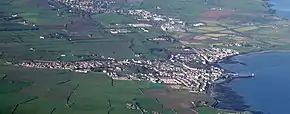
Isle of Man
In the Isle of Man the British monarch is Lord of Mann, a title variously held by Norse, Scottish and English kings and nobles (the English nobles in feudality to the English Crown) until it was revested into the British monarchy in 1765. The title "Lord" is today used irrespective of the gender of the person who holds it.
Relationship with the UK
Crown dependencies have the international status of "territories for which the United Kingdom is responsible" rather than sovereign states.[3] The relationship between the Crown dependencies and the UK is "one of mutual respect and support, i.e. a partnership".[28]
Until 2001, responsibility for the UK government's relationships with the Crown dependencies rested with the Home Office, but it was then transferred first to the Lord Chancellor's Department, then to the Department for Constitutional Affairs, and finally to the Ministry of Justice. In 2010 the Ministry of Justice stated that relationships with the Crown dependencies are the responsibility of the United Kingdom Government as a whole, with the Ministry of Justice holding responsibility for the constitutional relationship and other ministries engaging with their opposite numbers in the Crown dependencies according to their respective policy areas.[4]
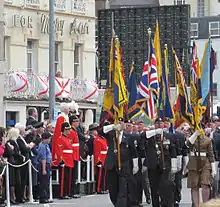
The British Government is solely responsible for defence and international representation[2] (although, in accordance with 2007 framework agreements,[29] the UK has elected not to act internationally on behalf of the Crown dependencies without prior consultation). The Crown dependencies are within the Common Travel Area and apply the same visa policy as the United Kingdom, but each Crown dependency has responsibility for its own customs and immigration services.
Acts of the British Parliament do not usually apply to the Channel Islands and the Isle of Man, unless explicitly stated. UK legislation does not ordinarily extend to them without their consent.[4] For a UK Act to extend otherwise than by an Order in Council is now very unusual.[2] When deemed advisable, Acts of Parliament may be extended to the islands by means of an Order in Council (thus giving the UK Government some responsibility for good governance in the islands). An example of this was the Television Act 1954, which was extended to the Channel Islands, so as to create a local ITV franchise, known as Channel Television. By constitutional convention this is only done at the request of the insular authorities,[30] and has become a rare option (thus giving the insular authorities themselves the responsibility for good governance in the islands); the islands usually prefer nowadays to pass their own versions of laws giving effect to international treaties.
Westminster retains the right to legislate for the islands against their will as a last resort, but this is also rarely exercised, and may, according to legal opinion from the Attorney-General of Jersey, have fallen into desuetude — although this argument was not accepted by the Department for Constitutional Affairs. (The Marine, Etc., Broadcasting (Offences) Act 1967 was one recent piece of legislation extended to the Isle of Man against the wishes of Tynwald.)
The States of Jersey Law 2005 established that all Acts of the United Kingdom and Orders in Council were to be referred to the States, thus giving greater freedom of action to Jersey in international affairs.
As in England, but not the United Kingdom as a whole, the Church of England is the Established Church in the Isle of Man, Guernsey and Jersey.[31][32]
In 2007–2008, each Crown Dependency and the UK signed agreements[29][33][34] that established frameworks for the development of the international identity of each Crown Dependency. Among the points clarified in the agreements were that:
- the UK has no democratic accountability in and for the Crown Dependencies, which are governed by their own democratically elected assemblies;
- the UK will not act internationally on behalf of the Crown Dependencies without prior consultation;
- each Crown Dependency has an international identity that is different from that of the UK;
- the UK supports the principle of each Crown Dependency further developing its international identity;
- the UK recognises that the interests of each Crown Dependency may differ from those of the UK, and the UK will seek to represent any differing interests when acting in an international capacity; and
- the UK and each Crown Dependency will work together to resolve or clarify any differences that may arise between their respective interests.
The constitutional and cultural proximity of the Islands to the UK means that there are shared institutions and organisations. The BBC, for example, has local radio stations in the Channel Islands, and also a website run by a team based in the Isle of Man (which is included in BBC North West). While the Islands now assume responsibility for their own post and telecommunications, they continue to participate in the UK telephone numbering plan, and they have adopted postcode systems that are compatible with that of the UK.
The Crown dependencies, together with the United Kingdom, are collectively known as the British Islands. Since the British Nationality Act 1981 came into effect, they have been treated as part of the United Kingdom for British nationality law purposes.[35] However, each Crown dependency maintains local controls over housing and employment, with special rules applying to British citizens without specified connections to that Crown dependency (as well as to non-British citizens).
Relationship with the Commonwealth of Nations
While their constitutional status bears some resemblance to that of the Commonwealth realms, the Crown dependencies are not members of the Commonwealth of Nations. They participate in the Commonwealth of Nations by virtue of their relationship with the United Kingdom, and participate in various Commonwealth institutions in their own right. For example, all three participate in the Commonwealth Parliamentary Association and the Commonwealth Games.
All three Crown dependencies regard the existing situation as unsatisfactory and have lobbied for change. The States of Jersey have called on the British Foreign Secretary to request that the Commonwealth Heads of Government "consider granting associate membership to Jersey and the other Crown Dependencies as well as any other territories at a similarly advanced stage of autonomy". Jersey has proposed that it be accorded "self-representation in all Commonwealth meetings; full participation in debates and procedures, with a right to speak where relevant and the opportunity to enter into discussions with those who are full members; and no right to vote in the Ministerial or Heads of Government meetings, which is reserved for full members".[36] The States of Guernsey and the Government of the Isle of Man have made calls of a similar nature for a more integrated relationship with the Commonwealth,[37] including more direct representation and enhanced participation in Commonwealth organisations and meetings, including Commonwealth Heads of Government Meetings.[38] The Chief Minister of the Isle of Man has said: "A closer connection with the Commonwealth itself would be a welcome further development of the Island's international relationships"[39]
Relationship with the Common Travel Area
All three Crown dependencies participate in an open borders area (also) comprising the United Kingdom and Ireland. Based on agreements that are legally binding, the internal borders of the Common Travel Area (CTA) are subject to minimal controls, if any, and can normally be crossed by British and Irish citizens with minimal identity documents with certain exceptions. Under Irish law Manx people and Channel Islanders, who were not entitled to take advantage of the European Union's freedom of movement provisions – are exempt from immigration control and immune from deportation from Ireland.[40]
In May 2019 both the British and Irish government signed a memorandum of understanding in an effort to secure the rights of Irish and British citizens post-Brexit.[41] The document was signed in London before a meeting of the British-Irish Intergovernmental Conference, putting the rights of both countries' citizens, that are already in place under the Common Travel Area, on a more secure footing. The agreement, which is the culmination of over two years' work of both governments, means the rights of both countries' citizens are protected after Brexit while also ensuring that Ireland will continue to meet its obligations under EU law. The agreement took effect on 31 January 2020 when the United Kingdom left the European Union. The maintenance of the CTA involves considerable co-operation on immigration matters between the British and Irish authorities.
Relationship with the EU
The Crown dependencies were neither member states nor associate members of the EU when the UK was a member of the EU.[42] The Crown dependencies were part of the customs territory of the EU.[42] They had free movement of agricultural goods to the EU.[42]
Certain aspects of membership of the European Union applied to the Crown dependencies, by association of the United Kingdom's former membership. For example, Article 355 (5)(c) of the Treaty on the Functioning of the European Union (TFEU) stated:
- this Treaty shall apply to the Channel Islands and the Isle of Man only to the extent necessary to ensure the implementation of the arrangements for those islands set out in the Treaty concerning the accession of new Member States to the European Economic Community and to the European Atomic Energy Community signed on 22 January 1972.;
and by Protocol 3 to the UK's Act of Accession to the Community:[43]
An Act to make provision in connection with the enlargement of the European Communities to include the United Kingdom, together with (for certain purposes) the Channel Islands, the Isle of Man and Gibraltar. [17 October 1972]"
Of the Four Freedoms of the EU, the islands took part in that concerning the movement of goods, but not those concerning the movement of persons, services or capital. The Channel Islands were outside the VAT area (as they have no VAT), while the Isle of Man was inside it.[44] Both areas were inside the customs union.[45]
Channel Islanders and Manx people are British citizens and hence were European citizens.[46] However, they were not entitled to take advantage of the freedom of movement of people or services unless they were directly connected (through birth, descent from a parent or grandparent, or five years' residence) with the United Kingdom.[47]
The Common Agricultural Policy of the EU never applied to the Crown dependencies, and their citizens never took part in elections to the European Parliament.
Brexit
With the Brexit negotiations, the House of Lords produced a report titled "Brexit: the Crown Dependencies", which stated that the "UK Government must continue to fulfil its constitutional obligations to represent the interests of the Crown Dependencies in international relations, even where these differ from those of the UK, both during the Brexit negotiations and beyond." [48] In the Great Repeal Bill white paper published on 30 March 2017 the UK government stated, "The Government is committed to engaging with the Crown Dependencies, Gibraltar and the other Overseas Territories as we leave the EU."[49]:ch.5
See also
References
- "Crown Dependencies – Justice Committee". Parliament of the United Kingdom. 30 March 2010. Retrieved 14 November 2016.
- "Background briefing on the Crown dependencies: Jersey, Guernsey and the Isle of Man" (PDF). Ministry of Justice. Retrieved 31 July 2017.
- "Fact sheet on the UK's relationship with the Crown Dependencies" (PDF). Ministry of Justice. Retrieved 25 August 2014.
- "Government Response to the Justice Select Committee's report: Crown Dependencies" (PDF). Ministry of Justice. November 2010. Retrieved 31 July 2017.
- "Profile of Jersey". States of Jersey. Archived from the original on 2 September 2006. Retrieved 31 July 2008.
The legislature passes primary legislation, which requires approval by The Queen in Council, and enacts subordinate legislation in many areas without any requirement for Royal Sanction and under powers conferred by primary legislation.
- "Review of the Roles of the Crown Officers" (PDF). States of Jersey. 2 July 2010. Archived from the original (PDF) on 12 August 2011.
- "Written Question To H.M. Attorney General by Deputy P.V.F. Le Claire of St. Helier". States of Jersey. 22 June 2010. Archived from the original on 27 September 2011.
- "The Air Navigation (Isle of Man) Order 2007 (No. 1115)". The National Archives. Retrieved 31 July 2017.
- "The Unregistered Design Rights (Bailiwick of Guernsey) Ordinance". Guernsey Legal Resources. 2005. Archived from the original on 21 July 2011.
- "Review of the Roles of the Jersey Crown officers" (PDF). States of Jersey. 30 March 2012. Retrieved 31 July 2017.
- de Woolfson, Joel (21 June 2010). "It's a power thing…". Guernsey Press. Archived from the original on 10 June 2011. Retrieved 31 July 2017.
- Mollet, Ralph (1954). A Chronology of Jersey. Jersey: Société Jersiaise.
- Leach, Robert (2011). "A Quick Guide to Legal Tender" (PDF). robertleach.co.uk. p. 3. Retrieved 24 October 2014.
- "CIA World Factbook: Guernsey". Central Intelligence Agency. Retrieved 3 November 2010.
- Balleine, G. R.; Syvret, Marguerite; Stevens, Joan (1998). Balleine's History of Jersey (Revised & Enlarged ed.). Chichester: Phillimore & Co. ISBN 1-86077-065-7.
- "States of Jersey Law 2005". Jersey Legal Information. 5 May 2006. Archived from the original on 31 October 2007.
- "The Council of Ministers". Isle of Man Government. Archived from the original on 29 April 2013. Retrieved 29 January 2013.
- "£105,000 – the tax-free reward for being a royal rep". This Is Jersey. 6 July 2010. Archived from the original on 16 August 2011.
- Ogier, Thom (3 July 2010). "Guernsey will choose its next Lt-Governor". This Is Guernsey. Archived from the original on 13 August 2011.
- "Review of the Roles of the Crown Officers" (PDF). States of Jersey. 29 March 2010. Retrieved 31 July 2017.
- Southwell, Richard (October 1997). "The Sources of Jersey Law". Jersey Legal Information Board. Archived from the original on 31 March 2012. Retrieved 31 July 2017.
- "Royal Insight". The official website of the British Monarchy. October 2003. Archived from the original on 15 December 2008. Retrieved 23 July 2008.
- "Royal Insight". The official website of the British Monarchy. January 2007. Archived from the original on 15 December 2008. Retrieved 23 July 2008.
- Matthews, Paul (June 1999). "Lé Rouai, Nouot' Duc". Jersey Legal Information Board. Archived from the original on 3 October 2011.
- Velde, François R. "Royal Styles and Titles in England and Great Britain: Duke of Normandy". Heraldica. Retrieved 31 July 2017.
- "Review of the Roles of the Crown Officers" (PDF). States of Jersey. 4 May 2010. Retrieved 31 July 2017.
- "Succession to the Crown (Jersey) Law". Jersey Legal Information Board. 2013. Archived from the original on 14 January 2015. Retrieved 24 November 2013.
- "Crown Dependencies – Justice Committee: Memorandum submitted by the Policy Council of the States of Guernsey". Parliament of the United Kingdom. October 2009. Retrieved 31 July 2017.
- "Framework for developing the international identity of Jersey" (PDF). States of Jersey. 1 May 2007. Retrieved 31 July 2017.
- "UK Legislation and the Crown Dependencies". Department for Constitutional Affairs. Archived from the original on 16 May 2008. Retrieved 31 July 2017.
- Gell, Sir James. "Memorandum Respecting the Ecclesiastical Courts of the Isle of Man..." Isle of Man Online. Retrieved 7 February 2017.
- "About". Guernsey Deanery. Church of England. Retrieved 31 July 2017.
- "Framework for developing the international identity of Guernsey". States of Guernsey. 18 December 2008. Retrieved 31 July 2017.
- "Framework for developing the international identity of the Isle of Man" (PDF). Isle of Man Government. 1 May 2007. Retrieved 31 July 2017.
- "[Withdrawn] Nationality instructions: Volume 2". UK Border Agency. 10 December 2013. Retrieved 31 July 2017.
- "Foreign Affairs Committee: Written evidence from States of Jersey". Parliament of the United Kingdom. Retrieved 18 March 2013.
- "Foreign Affairs Committee: The role and future of the Commonwealth". Parliament of the United Kingdom. Retrieved 18 March 2013.
- "Foreign Affairs Committee: Written evidence from the States of Guernsey". Parliament of the United Kingdom. Retrieved 18 March 2013.
- "Isle of Man welcomes report on Commonwealth future". Isle of Man Government. 23 November 2012. Archived from the original on 2 March 2013. Retrieved 19 March 2013.
- Per the provisions of the S.I. No. 97/1999 — Aliens (Exemption) Order, 1999 and Immigration Act 1999.
- "Memorandum of Understanding between the UK and Ireland on the CTA". GOV.UK. 8 May 2019. Retrieved 16 August 2019.
- Mut Bosque, Maria (2020). "The sovereignty of the Crown Dependencies and the British Overseas Territories in the Brexit era". Island Studies Journal. 15 (1): 151–168. doi:10.24043/isj.114. ISSN 1715-2593.
- "European Communities Act 1972". The National Archives. Retrieved 31 July 2017.
- "Article 6 of Council Directive 2006/112/EC of 28 November 2006 (as amended) on the common system of value added tax (OJ L 347)". EUR-Lex. 11 December 2006. p. 1. Retrieved 31 July 2017.
- "Article 3(1) of Council Regulation 2913/92/EEC of 12 October 1992 establishing the Community Customs Code (as amended) (OJ L 302)". EUR-Lex. 19 October 1992. pp. 1–50. Retrieved 31 July 2017.
- s 1 of the British Nationality Act 1981 grants citizenship to (most) people born in the 'United Kingdom'. s 50 of the Act defines the 'United Kingdom' to include the Channel Islands and the Isle of Man.
- Protocol 3 of the Treaty of Accession of the United Kingdom, Ireland and Denmark (OJ L 73, 27 March 1972).
- "House of Lords European Union Committee – Brexit: the Crown Dependencies" (PDF). Parliament of the United Kingdom. 23 March 2017. Retrieved 31 July 2017.
- "Legislating for the United Kingdom's withdrawal from the European Union" (PDF). Department for Exiting the European Union. 30 March 2017. Retrieved 31 July 2017.
External links
| Look up British Crown dependency in Wiktionary, the free dictionary. |
| Wikimedia Commons has media related to British Crown Dependencies. |
